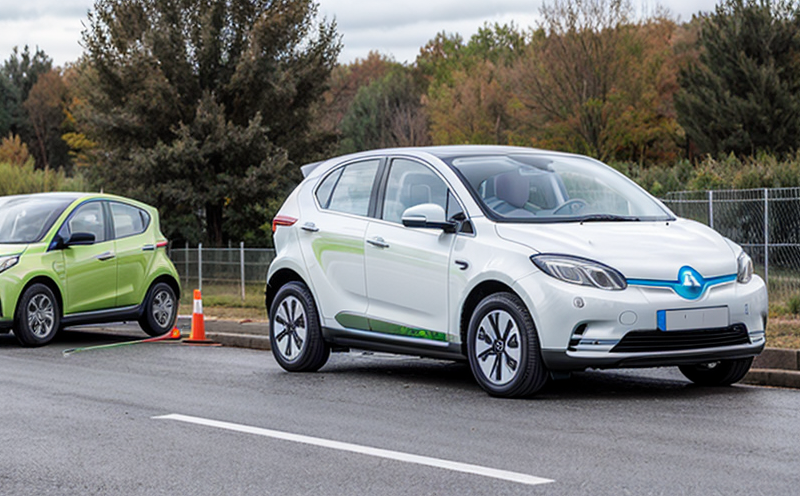UL 2580 EV Battery Safety and Performance Testing
The UL 2580 standard is a critical pillar in ensuring the safety, performance, and reliability of electric vehicle (EV) batteries. This testing ensures that all components meet stringent safety requirements before being integrated into electric vehicles or other e-mobility solutions.
UL 2580 covers a wide range of tests designed to assess various aspects of battery integrity including thermal stability, mechanical impact resistance, and electrical performance under stress conditions. These tests are essential for manufacturers aiming to meet regulatory requirements and demonstrate compliance with industry standards such as ISO, ASTM, EN, and IEC.
The standard is particularly important in the context of e-mobility because it addresses unique challenges posed by high-capacity lithium-ion batteries used in electric vehicles. These include risks associated with overcharging, short circuits, thermal runaway, and mechanical damage during transportation or operation.
Our UL 2580 EV Battery Safety and Performance Testing service offers a comprehensive suite of tests tailored to meet the specific needs of manufacturers and suppliers in this rapidly evolving sector. Our state-of-the-art facilities are equipped with advanced instrumentation capable of simulating real-world conditions, ensuring accurate and reliable test results.
Testing begins with initial inspection and specimen preparation, followed by rigorous testing protocols that include but are not limited to:
- Thermal stability tests
- Mechanical impact resistance tests
- Electrical performance under stress conditions
- Voltage regulation and balancing tests
- Overcharge and over-discharge tolerance tests
The data collected during these tests is meticulously recorded and analyzed, providing clients with detailed reports that highlight any areas needing improvement. This information can be crucial for continuous product development and quality assurance.
Benefits
By undergoing UL 2580 EV Battery Safety and Performance Testing, manufacturers gain numerous advantages:
- Increased confidence in the safety of their products
- Enhanced reputation among consumers who prioritize safety
- Compliance with international standards, facilitating market entry into regulated regions
- Reduced risk of recalls and product liability issues
- Improved efficiency in the R&D process through early detection of potential issues
In addition to these direct benefits, successful completion of UL 2580 testing can open new market opportunities by demonstrating commitment to high standards. This is especially valuable as regulatory bodies around the world adopt increasingly stringent safety measures for electric vehicle batteries.
Environmental and Sustainability Contributions
UL 2580 EV Battery Safety and Performance Testing plays a pivotal role in promoting sustainability within the e-mobility sector. By ensuring that batteries meet strict safety standards, this testing helps reduce risks associated with improper handling or disposal of hazardous materials.
The standard encourages manufacturers to adopt more sustainable practices throughout the lifecycle of their products, from design and manufacturing to end-of-life recycling. This not only enhances environmental protection but also supports broader corporate social responsibility initiatives.
Our testing service contributes significantly by:
- Identifying potential hazards that could lead to accidents or pollution
- Promoting the use of safer materials and processes in battery manufacturing
- Facilitating the development of more robust recycling solutions for spent batteries
Through these efforts, we help create a more sustainable future by supporting the creation of safer, longer-lasting electric vehicle batteries.
Use Cases and Application Examples
| Use Case | Description |
|---|---|
| Battery Integration Testing | Evaluating the safety and performance of batteries integrated into electric vehicles. |
| Design Validation | Verifying that new battery designs meet all specified requirements before mass production. |
| Supplier Qualification | Assuring the quality and reliability of batteries supplied to OEMs. |
| Compliance Audits | Ensuring compliance with local and international standards during periodic audits. |
| R&D Prototyping | Evaluating prototype batteries under various conditions to inform product development decisions. |
- Battery Integration Testing: This involves assessing the entire battery pack after integration into an electric vehicle. It checks for any issues that may arise from the interaction between different components of the system.
- Design Validation: For new designs, this test ensures they meet all safety and performance criteria specified in UL 2580 before going into production.
- Supplier Qualification: This process verifies that suppliers are delivering products that consistently meet the required standards.
- Compliance Audits: Regular audits ensure ongoing compliance with relevant regulations and standards, maintaining a high level of safety and quality control.
- R&D Prototyping: During R&D phases, this testing helps refine designs by identifying weaknesses early in the development cycle.





